
by Julia Felton | May 11, 2015
If leaders are to be successful they need to be able to influence and impact others. But what is impact and how is it created. My definition of personal impact is ‘The ability to command your audience, aligning your physiology and emotions to create the impact you intend.’ If you are able to do this it will automatically affect the tone of voice you use.
Why Physiology and Emotions?
In my workshops I often refer to the Mehrabian model on the impact of communication where 55% of what we communicate is through our physiology or our body language. This can be anything from facial expression, the way you stand or sit and breathing. It’s not about size, height or physical beauty. 38% of what we communicate is through tone of voice, which includes volume, timbre, speed, rhythm and the energy behind it.
Both tone and physiology are affected by our emotions. If you are fearful, happy, stressed it will show in both and people unconsciously read these. This leaves 7% of the impact in the words you use. It’s important to recognise that all 3 elements are significant and have to be aligned. Saying you are happy when your voice tone and body are clearly saying something different gives an incongruous message, as you are not being authentic and people immediacy recognise this. Admittedly sometimes this acknowledgement is not even conscious. When others experience us as inauthentic and incongruent it makes them wary of us as they are not sure what to expect and in a sales situation people will not buy from you.
So how do you create an impact?
The best way to create the impact you desire is firstly to be clear on what impact you want to create. This mean being authentic and having clarity on the outcome you want. Being laid back is great if that is the impact you want to create but this might not be the right approach if you want people to listen to your message and remember it.
Remember you create an impact from the moment you walk in a room or someone sees/hears you for the first time. Here are some simple steps you can begin to practice to create the impact you desire.
- Ask yourself – what is my intention in the meeting? What result do I want? What atmosphere do I want to create? Having got clarity on this;
- Ask yourself – how do I need to be to create/deliver this? What do I need to embody? Visualise how you will be walking into the room and interacting with others
- As you do this go through a basic centring practice:
- Stand with your feet hip width apart, balanced equally on each foot with your knees relaxed.
- Lift your rib cage slightly and relax your shoulders so you stand tall yet relaxed.
- Lift you head a look straight ahead, relaxing your jaw in the process.
- Now, if your breath hasn’t already shifted breath into your abdomen.
- Notice the shift in your body and your breath and the energy you need to create and project.
- If possible practice how you need to be.
Now, after the event reflect:
- Did you create the impact you wanted?
- If yes what did you learn that you can repeat or do more of?
- If not what did you notice about how you were? When did you ‘lose it?’
- What do you need to practice to do better next time?
- If possible get feedback.
In my experience the times I fail to make the impact I desired occur when I stop being authentic and try to be someone else. When I lack authenticity it becomes difficult to connect with the other person and communication channels become blurred. One of the best teachers I have ever come across when it comes to learning how to create an impact and be authentic are my horses. They never fail to give me honest feedback.
So if you are interested in developing your authentic communication skills I invite you to join me for the upcoming Art of Authentic Communication Workshop where my herd of horses will be your teachers.
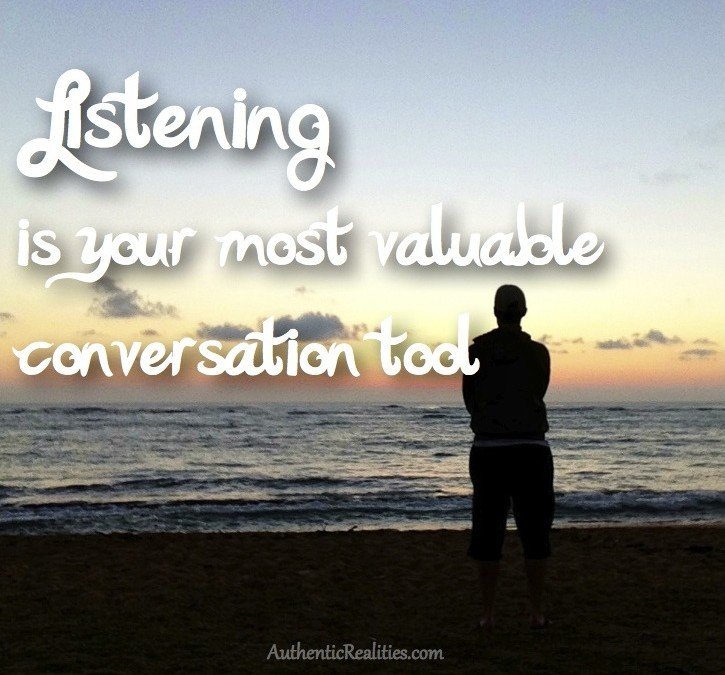
by Julia Felton | May 5, 2015
Our brains are hard-wired to do the opposite of listening unconditionally— listen for quick judgements. Our hunter-gatherer ancestors who could make quick determinations between the rustling of grass or a tiger survived. Those that wandered around, taking it all in, became lunch.
Our world today is different, and we are less likely to take creative risks or share with someone that we feel has passed judgement on us. According to Judith Glaser, author of Conversational Intelligence, the main purposes of listening are to judge, to reject or to connect. People determine if they are being judged or connected to in .07 seconds. How do you feel when you sense you’re being judged? How creative are you? Are you good at solving problems? Do you feel inspired? Thoughtful? Or do you want to find the safest answer as fast as you can in order to get out of the conversation?
If you listen unconditionally, that means that you are going into the conversation with the primary purpose of connecting, not deciding if you are going to accept or reject what the other person is talking about. Regardless of what the other says, you are coming from a place of curiosity. Nothing said will faze you. Next time you have a conversation, whether with a client, family member or coworker, rather than start with your thoughts, ask the other person for theirs. Continue to ask open-ended questions and just… listen. Do not analyze, do not plan, do not start making any choices. Then ask another open-ended question. If you’re stuck, one way to practice coming up with questions is using the click-down tool. Find the key word or phrase that would be blue and underlined if the conversation was transcribed on a webpage, and ask an open-ended question about it.
Listening unconditionally is not easy, but it is not impossible. In fact, the more you practice it the more natural it will become. So I challenge you. See how many conversations you can have in the next week where you only ask questions. You will find that you talk less and hear a lot more. In fact, you may even be inspired.
If you want to develop your listening skills then I invite you to join us at the Art of Authentic Communication Workshop being held as part of International Coaching Week.

by Julia Felton | Apr 28, 2015
Whilst good communication and leadership are all important, both in business and when working with horses, it is connection that forms the essential foundation of this triage. This is because if you can connect with others at all levels — one on one, in groups and with an audience — then relationships are stronger, your sense of community and belonging improves, your ability to create teamwork increases and your influence and productivity expands.
However, when people come to us with a problem, it’s easy to lapse into behaviours that — although usually well-meaning — serve to block us from hearing the other person’s experience, and so block the connection. We’d be better off following the words of this inside-out saying: “Don’t just do something; stand there”…and try not to:
- Counsel. Seek not to advise solutions (until asked) but listen and reflect back the person’s experience.
- Defend. When you explain, justify or rationalize, you invalidate the other’s experience. You can create a time to offer your experience, but for now, just listen.
- Shut down. This happens in parenting when we say things like: “Stop crying. It’s not that bad.” Children are more likely to stop crying when they feel they’ve been heard.
- One-up. Saying, “Oh, that’s nothing! Listen to what happened to me!” gives the message, “Your experience doesn’t count.”
- Reassure. It’s OK for people to feel their feelings. When we try to console (“It’s not your fault; you did the best you could…”), we take people out of their feelings.
- Pity. Sympathy and pity (“Oh, you poor thing!”) are very different from empathy, which is simply a respectful understanding of what others are experiencing.
- Commiserate. Sharing stories of your own similar experiences is not showing empathy; it turns the focus away from the person with the problem.
- Correct. First listen. After the other person feels fully understood, then see about correcting any misunderstandings or inaccurate impressions.
- Enlighten. Don’t attempt to educate unless your opinion is asked.
- Interrogate. Too many questions distract from the feelings at hand.
Learning to connect is one of the most important skills that we can learn, and it starts off by being genuinely interested in the other person and how they are feeling. Listen to what they are saying with your entire body, stay present and focused, be curious. If you exhibit all these skills then people are more likely to connect with you. Interestingly, these too are the skills required to connect with a horse which is why horses are the teachers on the upcoming Art of Authentic Communications workshop. You need to be able to communicate to connect.
The benefits of learning to communicate and connect are immense: better personal and family relationships, better business relationships and in general a better experience of life.

by Julia Felton | Apr 21, 2015
I was recently reading an article by Jim Rohn in which he said:
“Failure is not a single, cataclysmic event. We do not fail overnight. Failure is the inevitable result of an accumulation of poor thinking and poor choices. It is nothing more than a few errors in judgement repeated every day.
And failure’s most dangerous attribute is its subtlety. In the short term, small errors don’t seem to make any difference—we do not seem to be failing. In fact, sometimes these accumulated errors in judgement occur throughout a period of great joy and prosperity in our lives. Because there are no instant consequences to capture our attention, we simply drift from one day to the next, repeating errors, thinking the wrong thoughts, listening to the wrong voices and making the wrong choices. It is imperative to refine our philosophy in order to be able to make better choices.”
and it got me to thinking that relationships do not just disintegrate over night. They fall apart because of a consistent failure of communication.
Research studies tell us that 70% of workplace mistakes are a result of poor communication. Communication failures can be costly. It can cause loss of business, accidents, frustration, hostility, high employee turnover, low productivity and much more.
When we think about a failure in communication we often assume that two people have not spoken to each other about the issue. Maybe they have avoided having a conversation for fear of reprisals or have been afraid about how the other person will respond. However, communication is a two way street and it relies on:
- the ability to ask for what we want and
- the ability to really listen to what the other person needs.
Stephen Covey describes this ability to really listen to what the other person is saying as empathetic listening. It means listening with intent to really understand what is happening for the other person. Through empathic (from empathy) listening you can get inside another person’s frame of reference and see and experience the world through their eyes. This enables us to connect at a much deeper level.
However, empathetic listening is only possible when we are being truly authentic. When we are showing up as ourselves with no personal agenda and are open to hearing someone else’s point of view. Remaining authentic in our communication takes time and practice but impact is profound.
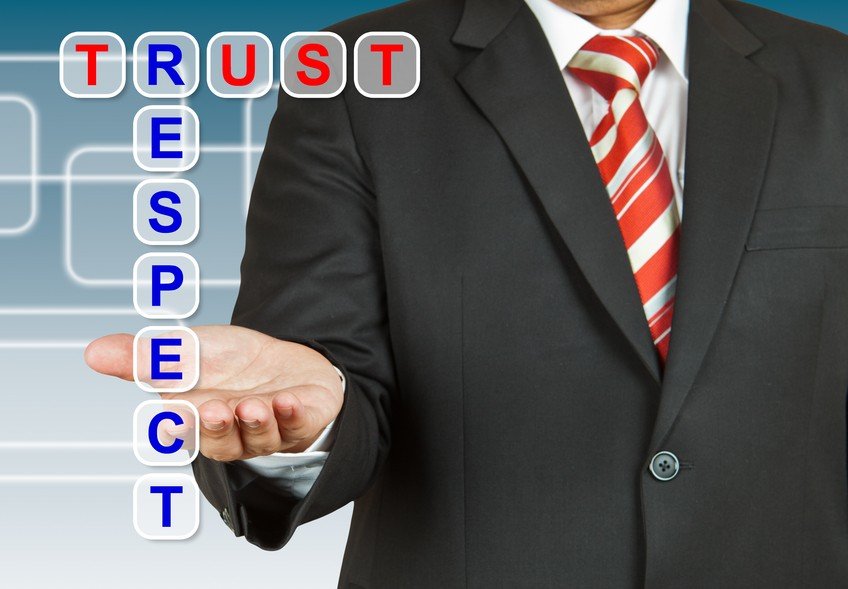
by Julia Felton | Apr 15, 2015
This week as I’ve been preparing for the Building Relationships To Build Your Business Workshop which I am hosting this weekend, I got to thinking about the relationship between trust and respect. Trust and respect are foundations of building great relationships whether in life or business, but how do these apply to leaders?.
Can you trust someone you don’t respect? Can you respect without trust? In all my years of being in business I can’t recall anyone that I really respected and who I didn’t trust. Although recently I did come across a stallion horse that I certainly respected for his power and presence, but to be honest I didn’t really trust him. In fact he intimidated me, and I was a little afraid, however I did trust myself that I knew enough to keep me safe by keeping him out of my personal space.
So whilst trust and respect can exist independently, it’s when they co-exist together that something magical happens. It is definitely a case of 1+1=3.
So let’s be clear on what are trust and respect. Trust is defined as reliance on the integrity, strength, ability, surety, etc., of a person or thing whilst respect is defined as a deep admiration for someone’s abilities, qualities or achievements.
So how do you build trust and respect with others? Here are six practices you can engage with:
1. Model The Way
“What you do speaks so loudly I cannot hear what you say. “ ~ Ralph Waldo Emerson
Both trust and respect are earned. The fastest way to earn them is to give them: Show others trust, give others respect.
2. Keep Your Commitments
Do what you say you will do. So if you agree to follow up with someone then make sure you do it. This builds credibility and shows you are reliable. And if for some reason circumstances change make sure you circle back and explain why you can no longer keep this commitment and ask to be released from your original promise.
3. Listen To Communicate
Being a great communicator means listening with your mind as well as your heart. What is being communicated by what isn’t being said? Listen to people and consider what they have to say with an open mind. Great communicators address both the “why” and the “how” of the situation. Trust your gut and learn to ask great questions.
4. Prepare for Confidence
Respect is born through the competence you show, one of the 5 pillars of trust. (The 5 pillars are Caring, Commitment, Consistency, Competence and Communication) Have the confidence born of knowledge and experience. When you speak, know what you are talking about. Remember, though: confidence is not arrogance; a confident leader is willing to admit his mistakes; hiding them is a sign of duplicity.
5. Make People Feel Safe
Create an environment where everyone feels that they can express their viewpoint. Respected leaders acknowledge they don’t know everything and they can learn a lot from other people. Keep an open mind and appreciate that everyone has something to teach you.
6. Lead From The Front
Do you want trust and respect from others? Start by trusting and respecting yourself. It means not putting yourself down when you make a mistake; own up to it and move on. Let yourself take risks based on your own values and strengths. Listen to that “inner voice” guiding your decisions.
What else are you doing to build trust and respect? I’d love to hear as the same principles apply whether you are building trust and respect with prospects, clients, suppliers or even your horse.
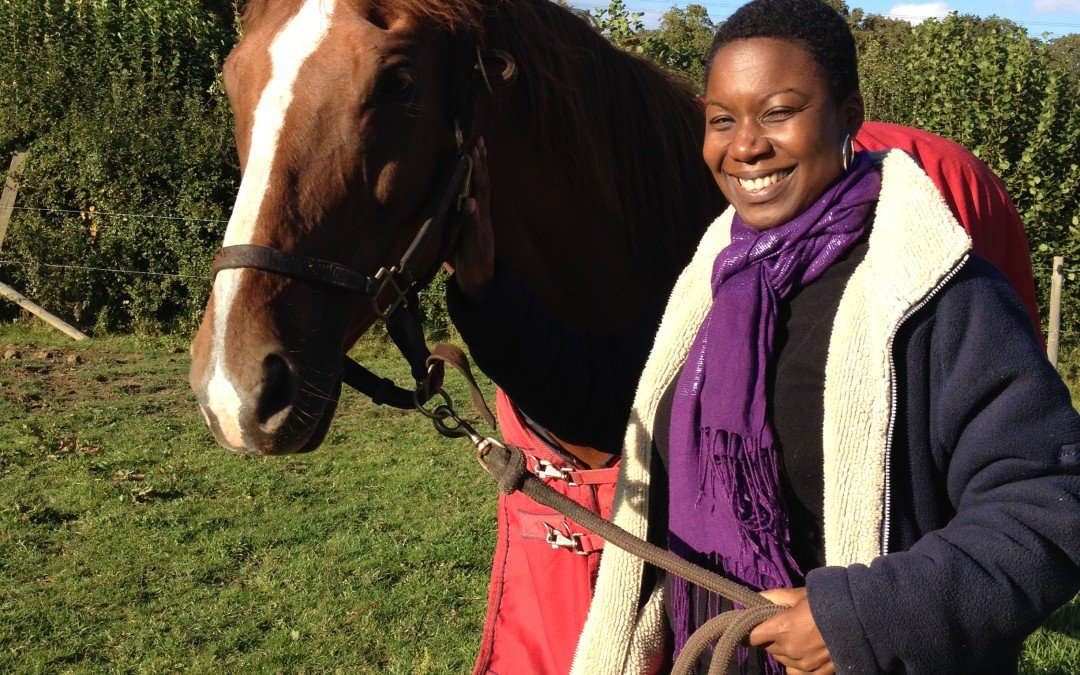
by Julia Felton | Apr 11, 2015
Happy 15th Birthday to Coach Charlie!.
As I’ve been watching the adverts for the upcoming Grand National this year, I couldn’t help but think about what happens to all those race horses after their competitive racing life is over. Although there are no comprehensive statistics on the subject it is estimated that “many thousands (of horses) are slaughtered annually in the UK and Ireland, after failing to make the grade as racers or when their racing days are over.”
There are a number of great establishments such as Retraining Of Racehorses (RoR) that seek to help race horses make the transition from the track into becoming a domesticated ridden horses but what about the race horses that are no longer rideable. Unfortunately in our society many of these find themselves on the way to the slaughter house.
This was the case with Charlie (aka Caymen’s Gift). Originally he came into my life as a riding horse but it soon became apparent that years of racing had taken their toll on his body physically and that he was experiencing arthritis and back pain. As stoic as he was he had kept on working despite being in some degree of pain. After some extensive veterinary investigations he was diagnosed as being lame on three legs and having a sore back. His riding days were over and to many people his usefulness would have come to an end, but Charlie was fortunate.
In the intervening years I had stumbled across the concept of coaching with horses. This is where people partner with horses to help business owners develop key leadership, team-working and communication skills. After 20 years of working in the corporate world and with a love of horses, this was the perfect new career for me and Charlie was a perfect coach for this work. Accustomed to being around people he easily made the transition into the Business HorsePower team and is now one of my lead coaches.
Since no riding occurs in my programmes Charlie is able to continue to contribute in a really positive way to society. Every year he helps business owners and their teams gain 100% unbiased instant feedback on their performance which is hard to ignore. He senses whether you are congruent and aligned in heart, body and spirit and has an innate ability to see deep into your soul and challenge those beliefs and false self-images that our ego puts up to protect us. He is also a master at ensuring you communicate clearly and authentically because if you don’t show up as a compelling leader him he will just ignore you and “go on strike”, just as one of my clients experienced the other day.
If you’d like to come and learn from Coach Charlie how to lead and inspire others, develop trust through the art of non-verbal communication and become a true leader then please reach out to us at connect@businesshorsepower.com and join the many others that Charlie has helped.
You can also find further information here.
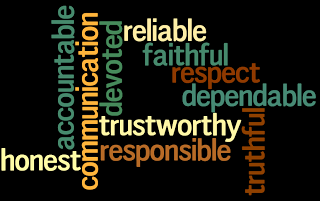
by Julia Felton | Apr 7, 2015
Trust is not an abstract, theoretical, idealistic goal forever beyond our reach. Trust—or a lack of it—is inherent in every action that we take and affects everything that we do. Trust is the cement that binds relationships, keeping spouses together, business deals intact and political systems stable. Without trust, marriages fail, voters become apathetic and organizations flounder. Without trust, no person or company can ever hope for excellence.
The truth is, trust must be carefully constructed, vigorously nurtured and constantly reinforced. Although it takes a long time to develop, it can be destroyed by a single action. And once lost, it is exceptionally difficult to re-establish.
Over the years horses have taught me much about how to build trust. The best lessons probably came from Bunny and Red, two rescue horses that were terrified of people. In order to build their trust I had to demonstrate consistent, credible behaviour. I had to do what I told them I would do, continually following through and also rewarding and acknowledging them for every action they took that enhanced our relationship. The truth is that it took a long time to build trust with these horses, but once formed we had an amazing relationship that still exists today. However, I am all too aware of how fragile that trust is and how easily it could be lost.The same principles for building trust with the horses can be applied to building more trustful relationships in business. Here are 14 things to remember when building trust, adapted from
Follow Your Conscience by Frank Sonnenberg:
1. Be straight with people. Tell it like it is.
2. Don’t be afraid to present bad news. It’s worse to sweep it under the rug.
3. Remain calm, cool and collected during difficult times.
4. Present both sides of an issue. (Let them judge for themselves.)
5. Be a good listener.
6. Disclose potential conflicts of interest.
7. Even a tiny exaggeration can destroy your credibility.
8. Always tell the truth or the truth will tell on you.
9. Your actions “off-stage” (like at an office party or on Facebook) impact your trust and credibility.
10. “Everybody does it” is a poor excuse for doing it yourself.
11. Learn how to disagree without being disagreeable.
12. Repeating a rumor is as vicious as starting one.
13. People will test you in small ways before trusting you outright.
14. The only thing worse than talking about others is talking about yourself.
If you’d like to learn how to build trust in your organisation then I’d be happy to talk with you because it has been shown that the higher the levels of trust in business the more profitable and successful the business can be.
Want to find out where you are most trusted in business, then take the free assessment here.
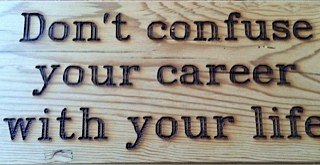
by Julia Felton | Mar 31, 2015
I don’t know about you but when I talk with many of my clients I often find that despite the fact that they are striving for success in their business, they are also engaging in acts that sabotage that success. I know that has been the case for me recently.
I have this picture in my bedroom that says: “Don’t confuse your career with your life”. I brought this when I was working in the corporate world but I have realised that this paradigm is still true for me when I’m running my own business. So many of us get focused on the success of our businesses that we fail to stop and review what is really going on in our lives.
There are definitely situations I am tolerating as a business owner that I would not when I was an employee, and to be truthful some of these are making me miserable. So why am I doing that? Why I am sabotaging my business success?
The irony is that ambition and the desire for success can in fact become the very thing that can sabotage your chances for success.
So, if you’re feeling physically or mentally burned out, there comes a point where you have to ask yourself, Is my career ambition taking over my life?If you don’t want your career ambition to block your own success her are four ways to keep that from happening:
1. Break the multitasking habit.
I have to confess that I’m a work-in-progress when it comes to realizing that multitasking is not my friend. I knew I had a serious problem when one day I looked up and realized that I had a notebook, laptop and iPhone all in front of me, and I was trying to do something different on each of them. Needless to say I wasn’t very productive and ended up with a bunch of partially finished things—not one thing actually completed.
No matter how skilled you think you are at dividing your attention, you really are more effective when you focus and break that Entrepreneurial ADD problem. Don’t jump ahead or try to do it all at once in an effort to save time. You’ll feel more accomplished, building momentum you need to go onto the next task, if you complete just one task at a time.
2. Catch some real Sleep.
Forget what you heard about sleep-deprived super-successful people. Getting no sleep and working through the night is overrated—the all-nighter, “I-only-need-four-hours-of-sleep” bit isn’t something to brag about. Because no matter how late you stay up, if you aren’t productively knocking things off your to-do list, it doesn’t really matter.
And if you’re waking up tired every morning, you will end up cranky and frustrated—and unproductive. Both your mind and your body need that time to rest and recover, to wake up refreshed. It’s not just OK to get that eight hours—it’s necessary to be at your peak, personally and professionally – and that happens when you get uninterrupted, deep sleep.
3. Stop comparing yourself to other people.
I have to confess to be a comparitus addict. I do it all the time, often under the guise of research. Every time I’m on LinkedIn or Facebook, I see what other business owners are achieving and compare myself to them. This then makes me feel bad that I’m not as successful in meeting my goals.
The thing about comparing yourself to others’ achievements is that there is never a win. Someone will always seem to be one step ahead of you. Make a commitment to only compare yourself to the best version of you.
4. Remember to make time for family and friends.
I get it. You’ve found your passion and you’re excited to get to work to make it a reality. You’re so excited and motivated that you’ve forgotten you need to spend quality time with the important people in your life.
Any relationship takes work—contact and communication—in order for it to stay alive, so make some time. You can’t discuss all of the progress you’re making in your career with your computer, and believe me, you don’t want to suddenly realize the only person you’ve had a real conversation with lately is Siri or your horses!. I’ve been told many times by my friends that I just need to take a break, have fun and “turn my brain off.” While I haven’t quite mastered that yet, what I have learned is that I don’t have to figure everything out right now.
So just remember work is just one part of your life and that whatever you are working on can wait for a minute or even an hour or two. Don’t be afraid to turn your brain off and rest and relax.

by Julia Felton | Mar 24, 2015
Trust “is both a mindset and a toolbox for 21st-century leadership”. Robert A. McDonald, Chairman, President and CEO, The Procter & Gamble Company
In today’s networked world, Trust has become the new currency – the critical competency for individuals, teams, organisations and even countries. Trust impacts every situation and relationship whether personal or professional.
Trust acts like a lubricant. It reduces friction and creates conditions for evolving high performance teams. How well the team works together is the true indicator of future success or the ability to manage through the struggle of relentless change. Without trust there would be no harmony in the team and business and dis-ease would prevail.
When we work in a high trust team things get done quicker and more easily. There is less conflict, less back-stabbing, less politics and more time spent on value added activities like innovative and customer service.
However, trust within teams does not happen overnight. As Joachim Low, the winning German Football Team World Cup coach noted “We’ve been together now for 55 days. We started this project 10 years ago, so this is the result of many years’ work, beginning with Jurgen Klinsmann. We’ve continued that work and our strength has been our constant progress. We’d not made this ultimate step before, but champions do what they will do. We believed we’d win it. We’re looking back over ten years of preparation and hard work. This team has developed a spirit which is unbelievable. We’re proud to be the first European team to win a title in Latin America, in Rio, in Brazil, in a footballing country par excellence… and this makes us proud.”
So what are the four key actions that team members must cultivate if they are to build and maintain trust with their fellow team members:
Commitment
Commitment is an important part of building trust. Every team member must acknowledge they play an important role in creating the success of the team and helping it achieve its goals. When one team member fails to deliver it has a knock on effect on everyone else in the team. This is why no matter if personal or professional obstacles present them team members must seek ways to keep their commitment to the team. Just as they need to rely on others, others must be able to rely on them.
Competence
Team members must trust that their teammates are competent and can successfully complete the tasks relevant to the team’s success. For example, each team member should be able to focus on an assigned task without worrying about teammates following through with their assigned tasks. Individual team members must realize when they need help and ask for it, instead of concealing weaknesses from the group. When team members show vulnerability to their teammates and the teammates respond in an efficient and helpful manner, trust will grow between them.
Communication
Consistent and meaningful communication is necessary for building a trusting relationship within a team. For instance, if a team member finishes a task early, they should communicate to their teammates that they are finished and ask if they can help another team member with their part of the work. If one team member discovers vital information that is relevant to the team’s success, such as a deadline change or a lack of resources, they should communicate it to the other members as soon as possible.
Collaboration
True collaboration won’t happen without a sense of trust between team members. When team members collaborate, they share creative ideas without fear that another team member will take credit for their ideas. Through collaboration innovative ideas are born. It is definitely a case of 1+1=3. When team members trust each other they are more likely to show their vulnerability, which in turn will build more trust within the team.
In summary trust anchors every successful team. When team members demonstrate commitment, competency, communication and collaboration then others will trust them and superior performance will result both in terms of productivity and profitability. However, when a team is forming who do you trust? In the words of Ernest Hemingway “The best way to find out if you can trust somebody is to trust them.”. Building trust is a two way street as you need to give trust in order to get it.
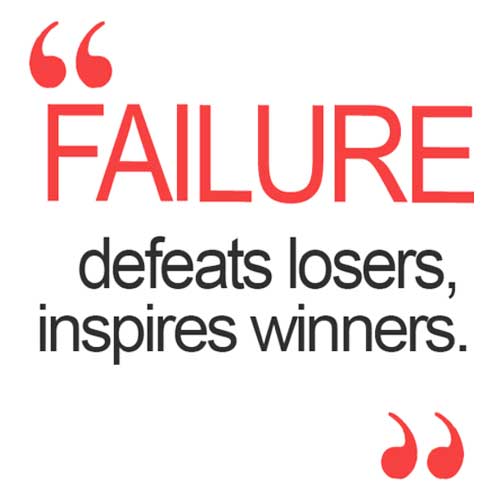
by Julia Felton | Mar 17, 2015
Thomas J. Watson, the founder and first president of IBM said: “Failure is a teacher – a harsh one, perhaps, but the best… That’s what I have to do when an idea backfires or a sales program fails. You’ve got to put failure to work for you … you can be discouraged by failure or you can learn from it. So go ahead and make mistakes. Make all you can. Because that’s where you will find success. On the far side of failure.”
I know when I was starting out in business I used to dread getting things wrong and having projects fail. I used to think that failure was something bad, to be avoided, but along the way I have begun to realise that my best lessons are learnt when I try something and it doesn’t turn out as planned. In effect I’ve failed but the feedback I get is priceless and it helps me calibrate my offering and do something different.
Recently I read an article about the African impala. They can jump to a height of over 10 feet and cover a distance of greater than 30 feet and yet these magnificent creatures can be kept in an enclosure in any zoo with a 3 foot wall. The reason is that these animals will not jump if they cannot see where their feet will land.
This is a lot like humans. Many of us will not live up to our full potential and achieve all we want to as we are afraid to take a risk. We are afraid to fail as society has conditioned us that failure is bad. That was certainly the messaging that I got as a chlld, however failure can be one more step on your road to success – you just have to turn it around in a positive direction. Failure can push you harder to succeed. Failure can strengthen your determination to overcome obstacles. Failure can make you braver in the face of opposition. Failure can help you learn what you need to do in order to succeed. Failure can teach you what your limitations are – and your strengths. Failure can encourage you to change your strategy.
“Failure is not an option” became a popular catchphrase after the release of the movie Apollo 13. Failure happens, but when you’re responsible for the people working for you, you have to do everything you can to guard against it.
As a leader, devote yourself to avoiding these crucial failures in leadership.
- Disconnecting from people. Don’t get so caught up in strategy and planning that you forget to talk to the people who work for you. Most of the time, they know more than you about how things work from the ground level, and their insights can be invaluable.
- Doing too much. Delegate appropriately so you don’t get overwhelmed and lose sight of the big picture. When you hire, look for people who can perform aspects of your job as well as or better than you can. Your role is complicated enough without adding tasks that your team should be able to handle.
- Avoiding risk. Play it safe, and your organization will never grow. That doesn’t mean being foolhardy with your organization’s assets. Seek opportunities everywhere, and be willing to commit resources wherever you’ve got a reasonable chance of success.
- Exhaustion. Take care of yourself, physically and mentally. Eat well, exercise, and take time off so you can stay fresh as you confront the day’s challenges. Pushing yourself to the brink will only increase everyone’s anxiety.
- Falling in love with authority. You’re the boss, not a monarch ruling by birthright. Don’t rely on your title, and the volume of your voice, to get employees to do what you want. Base your decisions on your experience and judgment, and be willing to listen to other points of view instead of assuming that only you know what’s right.
When J. K. Rowling, author of the phenomenally successful Harry Potter series, had been out of college for seven years, she found herself at a dark juncture in her life. At that time, she says, she had failed in life on an epic scale. “An exceptionally short-lived marriage had imploded. I was jobless, a lone parent, and as poor as it is possible to be in modern Britain without being homeless.”
In short, Rowling says she was the biggest failure she knew. And while she says there is nothing ennobling about being poor, she believes she reaped benefits from her failures. Failure, she says, stripped away all the inessential aspects of her life. She stopped pretending to be anything other than herself, and it was then that she began to earnestly pursue the only work that mattered to her. It was not, she says, the fairy-tale transformation to success so often written about her in the media.
And one thing I have learnt is that becoming successful – whatever that means for you – is never something that happens overnight. Despite all the media hype success takes hard work because it takes 10,000 hours to perfect your craft. So imagine the opportunity for failure along the way and embrace this and learn from the experience because this will help accelerate your success.
So what leaps of faith will you take today to move your business to the next level?















